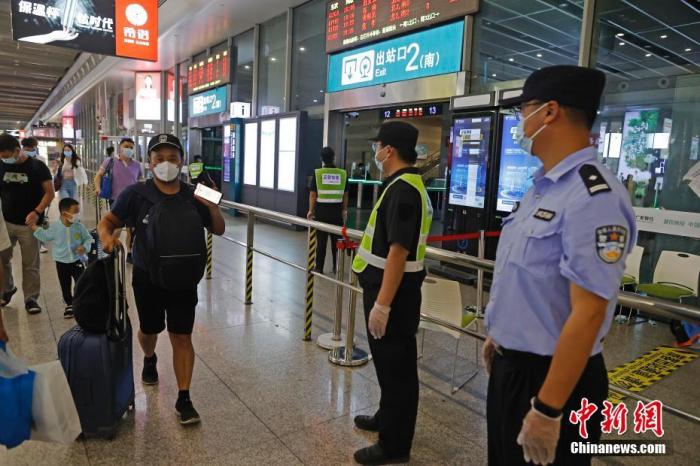China News Service, August 4th. Wu Shiping, deputy director of the Labor and Health Department of China National Railway Group, said on the 4th that in response to the outbreak of epidemics in many places in China, the national railway stations strictly implement the epidemic prevention and control requirements of the local governments, and resolutely prevent the entry of people who do not meet the travel requirements. Get on the train at the station.
Data map: On August 1, after arriving at Shanghai Hongqiao Railway Station, passengers presented their health codes to exit the station.
Photo by China News Agency reporter Yin Liqin
On August 4, the State Council’s Joint Prevention and Control Mechanism held a press conference on further strengthening the epidemic prevention and control situation.
At the meeting, a reporter asked questions that related cases of Delta mutant strains have recently appeared in many places, and there is a high mobility of people on railway high-speed trains. What countermeasures should the railway department take?
Wu Shiping said that in response to the recent epidemics in many places in China, the railway department adheres to the principle of people first and life first, and earnestly implements the prevention and control strategy of "foreign defense import, internal defense rebound", combined with the current epidemic situation, focusing on the following Six measures.
First, train stations across the country strictly implement the epidemic prevention and control requirements of the local governments, and resolutely prevent people who do not meet the travel requirements from entering the station and boarding the train.
Second, in accordance with the requirements of the capital's epidemic prevention and control, the sale of tickets for trains entering Beijing in medium- and high-risk areas such as Nanjing and Zhengzhou has been suspended.
The third is to introduce free refund measures to guide passengers to rationally arrange their itineraries, reduce the flow of people, and reduce the risk of the spread of the epidemic.
The fourth is to continue to strengthen the prevention and control of station cars, strengthen the disinfection and ventilation of station cars, maintain a safe distance, and guide passengers to wear masks throughout the journey.
At the same time, emergency response has been strengthened, and isolation seats have been set up on the trains. In the event of feverish passengers, they shall be isolated and disinfected in time and handed over to the local epidemic prevention department.
The fifth is to strengthen the management of railway cleaning operations, adhere to the principle of disinfection before cleaning, strict operation standards and work procedures, strengthen the management of cleaning personnel, prevent cross-mixing operations, and ensure the health and safety of employees.
Sixth, comprehensively strengthen employee protection and health monitoring.
Take necessary and effective prevention and control measures for personnel in key railway posts and major types of work to maintain the safe and smooth operation of the railway.

